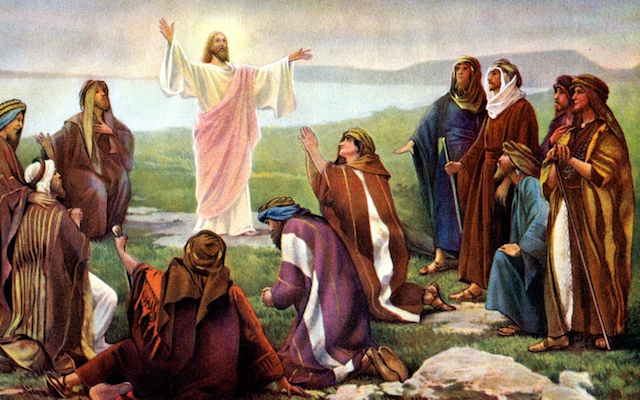I find the sequence of events in the First Reading for this week interesting. The centurion is renowned for his good works and prayer. He is visited by an angel who instructs him to get in touch with St Peter. Peter in the meantime receives a vision which tells him that it is up to God to decide what is ritually clean and unclean. This makes sense to Peter only when the servants of the centurion arrive. Peter then visits the Gentile soldier and discovers him to be a man of faith. He proclaims to them the Good News and the Holy Spirit falls upon the Gentiles. Peter is amazed that the Holy Spirit has been "poured out" on the Gentiles just as it was with the Jews on Pentecost as had been foretold in prophecy (Acts 2: 17). The Gentiles are then baptized. In this way we see that there is a second Pentecost - of the Gentiles - just as we see the Christmas of the Gentiles when the Wise Men find the child Jesus. In this way we see how the Jews were prepared for the Incarnation by the Scriptures and they receive the Holy Spirit first. The Gentiles, prepared for the Good News by good works and prayer, also receive the Holy Spirit as they accept what has been preached to them and are opened to the Holy Spirit and the sacraments. As disciples of the Lord in 2018 we need to understand how the Holy Spirit prepares the way for our efforts to share the Good News and open up those he has chosen to receive the Holy Spirit. It is not us who have the power but it is the Word and the influence of the Holy Spirit. We should not look for any credit for our evangelizing efforts: "Do you thank the slave for doing what was commanded? So you also, when you have done all you were ordered to do, say, 'We are worthless slaves; we have done only what we ought to have done!' "
Monday, 30 April 2018
Friday, 20 April 2018
5th Sunday of Easter
Jesus says: "You have already been cleansed by the word that I have spoken to you." (Jn 15: 3) What does it mean that we are pruned/cleansed by his words? Anyone who grows grapes will have seen the tangle of branches that remain as autumn turns to winter. Even the dead leaves have gone. What was once green and beautiful with sweet grapes hanging from the branches is now dead and desiccated. Likewise, the cares of life and the burdens we carry can cause us to wither. We can get tangled up in self -justifications, rationalizations and excuses for our plight. We also hear it in the media when someone who has sinned says: "I made a mistake." We need Jesus: "Christ the power of God and the wisdom of God" (1 Cor 1: 24) to speak to us. It is his love and mercy, revealed and active in the Scriptures and the sacraments that cleanses us of delusions and anxiety. We know that we are both loved and called from the beginning. If we listen to him and obey his word we will be renewed and in due season new branches will spring forth so that the fruit of the virtues will yield a wine of faith, hope and love. "So we do not lose heart. Even though out outer nature is wasting away, our inner nature is being renewed day by day. For this slight momentary affliction is preparing us for an eternal weight of glory beyond all measure, because we look not at what can be seen but at what cannot be seen; for what can be seen is temporary, but what cannot be seen is eternal." ( 2 Cor 4: 16-18)
Wednesday, 11 April 2018
4th Sunday of Easter
Jesus declares: "So there will be one flock, one shepherd." (Jn 10: 16) In the secular world this is threatening. In a relativistic environment any talk of "oneness" is perceived as a menace to the freedom of others. Likewise, St Paul says: "There is one body and one Spirit, just as you were called to the one hope of your calling, one Lord, one faith, one baptism, one God and Father of all, who is above all and through all and in all." (Eph 4: 4-6) Yet, it is only in Christ and joined to him that we can know the true freedom to be ourselves. The totalitarian relativism that suppresses difference to allow for "diversity" hides a will to power of elites who mask their control of society through the promotion of minorities who are dependent on them. These are used as a vehicle for instituting a new norm that proscribes what was previously regarded as "normal." Paradoxically, as it was with the Roman Empire, you can worship any God as long as you worship Caesar (the dollar) above all. In this world one can can't acknowledge any religion because that would be an affront to those who have no religion. One can't have an ordained priesthood because that would be an insult to those who are not ordained. Paul tells us: "Now you are the body of Christ and individually members of it. And God has appointed in the church first apostles, second prophets, third teachers; then deeds of power, then gifts of healing, forms of assistance, forms of leadership, various kinds of tongues." (1 Cor 12: 27-28) All of these complement each other and find their beginning and end in love which abides as the greatest of God's gifts (See 1 Cor 13: 13). On Good Shepherd Sunday let us sincerely pray for shepherds to help the one Good Shepherd in leading, ministering to and sanctifying the one flock.

Monday, 9 April 2018
3rd Sunday of Easter
The accounts of the Resurrection appearances given us by the Gospels are varied and incomplete. There are those we do not hear about such as that mentioned by St Paul where Jesus appeared to 500 of the disciples at the same time (1 Cor. 15: 6). Although some of the details are different the evangelists are all at pains to emphasize that although the risen body is in continuity with the earthly Christ. As we hear in today's gospel his wounds are visible and he is able to eat while, at the same time, Christ is not limited physically by time or space. He is not a ghost but, at the same time, he is not merely revived as Lazarus was. This is not the end of the situation. He has a message to give and it is the same in all the gospels: the Scriptures have been fulfilled and the disciples are to be the witnesses to the resurrection throughout the world. To accomplish this task they are fortified because they do not act alone: "And they went out and proclaimed the good news everywhere, while the Lord worked with them and confirmed the message by the signs that accompanied it." (Mk 16: 20)

Monday, 2 April 2018
2nd Sunday of Easter
There have been numerous individuals who, by force of arms, have tried to "conquer the world": Caesar Augustus, Genghis Khan, Napoleon Bonaparte, Adolf Hitler, etc. Joseph Stalin said in 1935: "The Pope. How many divisions does he have?" Yet, we hear in today's Second Reading: "Who is it that conquers the world but the one who believes that Jesus is the Son of God?" (1 Jn 5: 5) The way Jesus conquered the world is through his victory over sin and death in the Resurrection. His divine mercy is poured out on all who believe in him and in this way they participate in his triumph. Let us not look to impose our will on the world or to fight its injustices by worldly means. We will only be successful when all that we say and do is done with the conviction that Jesus is who he said he was and that he has indeed won for us an eternal victory that helps us to live as a pilgrim people journeying through a world of fear and anxiety to our heavenly home.
Subscribe to:
Comments (Atom)